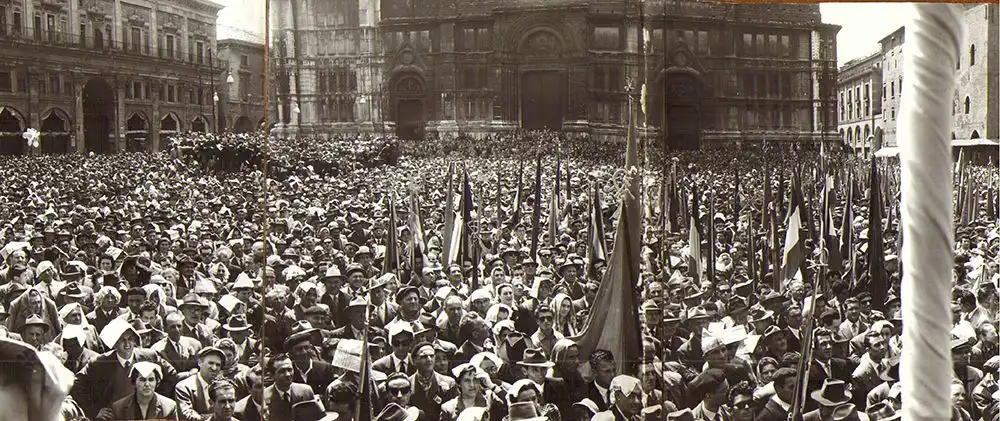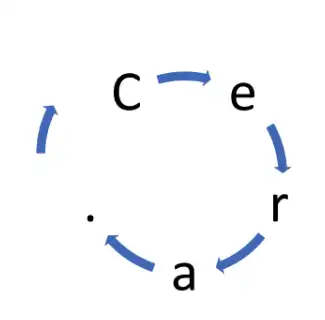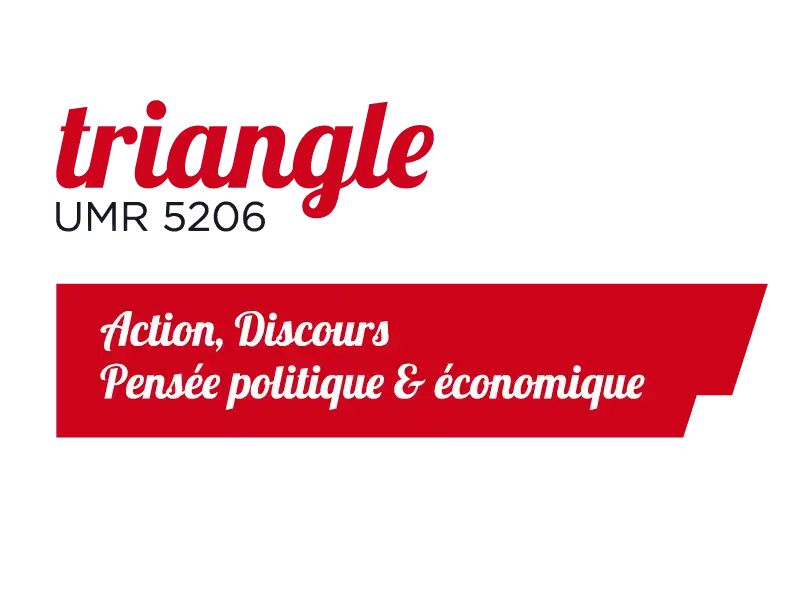
Home>The Research>Seminars>Seminars by focus area and theme>Research group on contemporary italy (GRIC)
Research group on contemporary italy (GRIC)
Research theme: Government | Institutions, Knowledge, Norms

The People in contemporary Italy
The concept of the 'people' has run through Italy's contemporary history despite, or perhaps because of, the ambiguous relationship between the political elites and intellectuals. In the Prison Notebooks, Gramsci argued that in Italy, unlike France, there was no such thing as a ‘people-nation’. At the end of the Fascist period, Mussolini saw the people as the main cause of his failures, saying in 1940 that ‘it is good for the Italian people to be put to the test
and shaken out of several centuries of mental laziness’ or that ‘they must be led by the rod, the rod and the rod again’. Unfit to be a nation for some.
Impossible to govern or transform for others, irremediably fractured between different entities according to others, the Italian people are the subject of debate.
And yet, the concept has been invoked and appropriated in many ways by all political families. On the left: in 1848, Mazzini founded the daily L'Italia del popolo. Bandiera Rossa, the most famous song of the Italian workers' movement, began with an appeal to the people. But it was also on the right and centre-right: from the Fascist daily Il Popolo d'Italia, the official voice of the regime during the ventennio, to the organ of Christian Democracy, Il popolo, published between 1944 and 1994. When Silvio Berlusconi came to power, Italy was presented as the laboratory of a ‘people's democracy’ (Diamanti-Lazar)?
At a time when populism is on the rise and illiberal political forces are trying to mobilise the people against democracy, we would like to look back, from the perspective of political and socio-cultural history, at the singular place of this concept in contemporary Italy.
- 16/10/2025
Gramsci, le peuple et la religion
Marie Lucas (Ecole Française de Rome)
- 06/11/2025
Le peuple dans la culture catholique de l'Italie contemporaine XIX-XX siècle
Andrea Riccardi
- 27/11/2025
Curare il popolo per fare la nazione. Epidemie di colera e istituzioni nella Sicilia del Risorgimento
Matteo Di Figlia (Université de Palerme)
- 11/12/2025
La place du peuple dans le corporatisme
Matteo Pasetti (Université de Bologne)
- 15/01/2026
Les prêtres ouvriers et le peuple italien
Marta Margotti (Université de Turin)
- 29/01/2026
Le peuple de la Sicile en 1943
Rosario Mangiameli (Université de Catane)
- 12/02/2026
Andrea di Michele
- 12/03/2026
Le peuple de Mussolini
Marie-Anne Matard Bonucci (Université de Paris 8)
- 26/03/2026
L'antifascisme et le peuple italien
Stefanie Prezioso (Université de Lausanne)
- 09/04/2026
Le peuple entre dictature fasciste et invention de la démocratie
Mark Gilbert
- 07/05/2026
Le 25 avril, une renaissance du peuple italien ?
Rosario Forlenza (LUISS)
- 21/05/2026
Les populistes italiens et le peuple depuis les années 1990
Marc Lazar (Sciences Po/LUISS)
Italy and the world
Calendar 2024-2025
The Italian peninsula's unique geographical position has partly determined its history, which has been marked by conflict but also by cultural and commercial exchanges with the rest of the world. Mainly centred around the Mediterranean in ancient times, the peoples and rulers of the peninsula then turned their attention to the European continent and the Orient. In modern times, the relationships forged with other continents and the geopolitical upheavals taking place around the world make it essential to adopt an international perspective. Looking at Italy and its relationship with the world, from Unity to the present day, enables us to broaden our focus to see how the Bel paese has lived through the high points of its national history and faced up to the challenges of the twentieth and twenty-first centuries.
Italy has long been a country of emigration, before recently becoming a land of immigration. We therefore need to look at the formation and presence of Italian diasporas in many countries since the 19th century. What links have these Italian communities maintained with their countries and regions of origin? How have they integrated into the countries where they have settled? What forms of Italianness have they exported? But also how have Italy been viewed from abroad? And how has Italy (authorities, parties, associations, public opinion) reacted recently to the migration crisis? In terms of international relations, how has Italy interacted with its partners, particularly in Europe, on geopolitical and strategic issues, as well as political and cultural ones? Are these relations characterised over the long and medium term by continuities or by ruptures? These are some of the questions that will guide the GRIC's seminar in 2024-2025, and will be the focus of contributions from the researchers taking part in its activities.
- 10/10/2024
L’Italia e le sue ex colonie. Istituzioni, istituti e traiettorie professionali tra continuità e rotture.
Beatrice Falcucci (Université Pompeu-Fabra - Barcelone)
- 10/24/2024
L'italianité des Ciociari de passage à la Plaine-Saint-Denis, 1880-1930
Fabrice Langrognet (CNRS)
- 11/14/2024
Migrations et capitaux italiens à travers le monde, du milieu du XIXe siècle à la Première Guerre mondiale
Thibault Bechini (EFR)
- 11/28/2024
Fascisme et démocratie en Italie après 1945. Regards extérieurs sur une coexistence difficile
Andrea Martini (Paris 8)
- 12/19/2024 (en visioconférence)
“Inventer l'avenir". La France, l'Italie et la construction européenne (1981-1995)
Giovanni Lella (LUISS)
- 01/23/2025
Le fascisme à l’étranger : La Casa d’Italia de Marseille
Stéphane Mourlane (Université Aix-Marseille)
- 02/13/2025
La politisation des immigrés italiens dans le Nord-Pas de Calais entre 1938 et 1948
Elisa Pareo (Université de Vérone-Paris 8)
- 03/20/2025
L’espansione e l’insediamento delle mafie italiane all’estero
Federico Varese (Sciences Po)
- 04/012025
1938. L’applicazione delle leggi razziali nella Regia Università di Roma: percorsi, questioni, ricerche
Serena Di Nepi et Umberto Gentiloni (Università la Sapienza, Roma)
- 04/10/2025
Les lecteurs de langue et littérature italiennes dans les universités allemandes et européennes (1922-1945) : agents d’une diplomatie culturelle sous le fascisme ?
Claire Lorenzelli (ENS de Lyon)
- 04/17/2025
L'immigration en Italie : évolution historique et réponses juridiques
Carolina Simoncini (Université Lyon 3)
- 05/15/2025 - Session cancelled
La tradition en suspens ? Femmes italiennes en migration au début du XXe siècle.
Caroline Douki (Paris 8)
- 06/05/2025 - Session cancelled
L’émergence et le succès de la Public History en Italie
Serge Noiret (Institut Européen de Florence)
Histoire, mémoires et identités collectives dans l'italie contemporaine
Comme la plupart des pays d’Europe occidentale, l’Italie est traversée, et souvent divisée, par d’intenses débats sur ce que devraient être les politiques mémorielles. À défaut de s’accorder sur leur contenu, les politiques sont unanimes pour considérer celles-ci comme essentielles pour assurer la cohésion de la société – sans d’ailleurs que l’on puisse vérifier si elles ont bien un tel effet vertueux. Pour cette deuxième année, la réflexion sera examinée en rapport avec la question des identités collectives, à différentes échelles : locale, régionale, nationale, transnationale. L'articulation des rapports entre mémoire politique et identités collectives sera analysée sous l'angle des politiques publiques et des pratiques et mobilisations des acteurs sociaux.
Que nous disent les politiques mémorielles et les usages publics de l’histoire de l’Italie contemporaine, des partis politiques et des différents acteurs sociaux ? Dans quelle mesure l’obsession mémorielle représente-t-elle un substitut à des formes d’engagement en crise ? Contribuent-elles à recréer du lien social et in fine induisent-elles de nouvelles formes de mobilisation politique ?
- 12/10/2023
La postérité d'Antonio Gramsci dans la vie politique italienne. Romain Descendre (ENS Lyon), Jean-Claude Zancarini (ENS Lyon) - 09/11/ 2023
Verdi dans la mémoire nationale. Antonin Durand (Sorbonne-Université) - 23/11/2023
Le memorie rimosse della Repubblica: il colonialismo fascista, i crimini del comunismo. Marcello Flores - 21/12/2023
« L'antimafia » : un combat fondateur d’une nouvelle identité politique ? Charlotte Moge (Lyon 3) - 18/01/2024
La mémoire de l’attentat de Bologne dans l’Italie républicaine. Anna Lisa Tota (Université Rome 3) - 08/02/2024
"Mémoire et oubli du passé communiste, du PCI au PD". Alexandre Chabert (Sciences Po, Centre d'histoire) - 07/03/2024
Les mémoires de 68 en Italie. Francesca Socrate (La Sapienza) - 28/03/2024
Un second Risorgimento : la mémoire de la Résistance dans l'Italie républicaine. Rosario Forlenza, ( LUISS) - 11/04/2024
L’orientalisme littéraire italien et la glorification de l’identité nationale (XIXe - début XXe) Armelle Girinon (La Sapienza) - 23/05/2024
Immaginari e rappresentazioni. L'identità delle mafie tra XX e XXI secolo. Marcello Ravveduto (università di Salerno, Digital Public History) - 30/05/2024
Femmes et fascisme : quelle mémoire ? Suzy Toson, (Paris8-Sciences Po, CHSP) - 13/06/2024
Quelle place dans la mémoire de l’antifascisme ? Colloque Gaetano Salvemini
Mémoire et politique dans l'italie contemporaine
Comme la plupart des pays d’Europe occidentale, l’Italie est traversée, et souvent divisée, par d’intenses débats sur ce que devraient être les politiques mémorielles. À défaut de s’accorder sur leur contenu, les politiques sont unanimes pour considérer celles-ci comme essentielles pour assurer la cohésion de la société – sans d’ailleurs que l’on puisse vérifier si elles ont bien un tel effet vertueux.
En effet, depuis les recherches s’inscrivant dans la continuité des « lieux de mémoire » de Pierre Nora, qui mettaient l’accent sur la formation de symboles partagés qui cimentent des identités essentiellement nationales, les nombreux travaux qui ont été consacrés aux politiques mémorielles en Europe, et en Italie démontrent que les processus de fabrication des mémoires collectives sont complexes et ambivalents. Cette dimension de la mémoire, entendue dans le sens d'usage politique du passé, et le discours qui porte sur l'importance de l'établissement de « mémoires partagées », ne doit pourtant pas dissimuler la tension politique qui procède à la sélection des « récits » valorisés, et de leurs représentations dans l'espace public qui découle de ce choix politique. Ce processus actif de construction des mémoires, enjeu de négociation et parfois de conflits, est particulièrement apparent dans les cas de sortie de crise, à l'issue de moments historiques caractérisés par la prolifération de violences politiques.
L’Italie républicaine occupe une place spécifique dans ce cadre européen, à plus d’un titre. Les historiens s’accordent en général pour identifier trois grandes phases caractéristiques de la péninsule :
- la construction d’une mémoire « officielle » de l’antifascisme et de la résistance après 1945, progressivement en crise, à partir des années 1970, avec l’érosion du paradigme antifasciste.
- une nouvelle période s’ouvre avec la décennie 1990 en rapport avec les événements européens et, nationalement, le contexte de crise politique de la « Première République » : la remise en question de la mémoire antifasciste s’approfondit dans la nouvelle configuration politique portée au pouvoir par Silvio Berlusconi, et la légitimation de partis étrangers à la culture politico-mémorielle d’après-guerre (Forza Italia, Ligue du Nord) sinon hostiles (MSI-Alleanza Nazionale).
-Les années 2000 marquent la volonté de dépassement des clivages mémoriels par la mise en place d’un nouveau calendrier de célébrations nationales, l’absence de récit partagé cédant la place à la fragmentation de mémoires construites, cette fois, à partir d’un paradigme victimaire. Au calendrier républicain antifasciste (célébrations du 25 avril (pour la résistance) et du 2 juin (fête de la République) sont ajoutées différentes journées de « célébration » au gré des débats et rapports de force politique.
Certaines participent d’un calendrier international, comme le « 27 janvier », journée de la mémoire des victimes de la Shoah ; d’autres ont une signification strictement italienne comme le 9 mai, journée d’hommage aux victimes du terrorisme, en référence à l’assassinat d’Aldo Moro, ou encore le 21 mars, premier jour du printemps et journée de souvenir des victimes de la mafia. Certaines participent d’une culture plutôt ancrée à gauche - c’est le cas, par exemple, de la journée en mémoire des victimes de l’immigration dite aussi journée de l’accueil, le 3 octobre, pour commémorer le naufrage, en 2013, lors duquel, au large de Lampedusa, 368 personnes trouvèrent la mort. D’autres ont été portées plutôt par la droite, sinon l’extrême-droite comme celle du 10 février, Jour de commémoration des victimes des Foibe.
Parallèlement à ces journées de commémoration officielles, qui ont dans la plupart des cas fait l’objet de lois et dont l’inventaire produit ici n’a rien d’exhaustif, il convient d’ajouter de multiples initiatives mémorielles portées par des associations ou des institutions locales souvent destinées à contester une histoire officielle : on se contentera de citer ici les débats autour de l’institution d’une journée des « victimes méridionales » du Risorgimento en 2017 qui a vu les historiens très mobilisés ou encore la proposition d’instauration d’une journée des victimes du colonialisme italien, à la date du 19 février, choisie pour évoquer le massacre de milliers de civils perpétré à Addis Abbeba en 1937 en
représailles à un attentat contre le vice-roi d’Éthiopie Rodolfo Graziani.
Que nous disent les politiques mémorielles et les usages publics de l’histoire de l’Italie contemporaine, des partis politiques et des différents acteurs sociaux ? Dans quelle mesure l’obsession mémorielle représente-t-elle un substitut à des formes d’engagement en crise ? Contribuent-elles à recréer du lien social et in fine induisent-elles de nouvelles formes de mobilisation politique ?
- 18/10/2022
Mémoires publiques et enjeux partisans dans l'Italie républicaine.
Filippo FOCARDI, Professeur à l'Université de Padoue. Filippo Focardi a notamment publié :
La guerra della memoria : La Resistenza nel dibattito politico italiano dal 1945 a oggi, Rome-Bari, Laterza, 2020 ; L'Italie, alliée ou victime de l'Allemagne nazie, Bruxelles, 2014.
[séminaire en visio-conférence] [en italien] - 22/11/2022
Existe-t-il une contre-mémoire de droite du Risorgimento ?
Simon SARLIN, Maître de conférences à l'Université Paris-Nanterre, ISP. Simon Sarlin a notamment publié :
Le Légitimisme en armes. Histoire d’une mobilisation internationale contre l’Unité italienne, Rome, École française de Rome, coll. B.E.F.A.R., 2013. [séminaire en format hybride] [en français] - 31/01/2023
Les enjeux politiques de la mémoire de la Shoah en Italie.
Guri SCHWARZ, Professeure à l'Université de Gênes - 14/02/2023
La Mémoire des Foibe dans l'Italie républicaine.
Tullia CATALAN, Professeure à l'Université de Trieste - 14/03/2023
Les lieux de mémoire de la déportation en Italie.
Chiara BECATTINI, Docteure, Università degli studi di Padova / Université Paris 8 - 04/04/2023
La mémoire du colonialisme italien dans l'Italie républicaine, entre occultation et rémanence.
Valeria DEPLANO, Professeure à l'Université de Cagliari - 18/04/2023
Quelle mémoire pour l'émigration italienne ?
Renato CAMURRI, Professeur à l'Université de Vérone - 09/05/2023
Le rôle des associations de victimes du terrorisme dans la construction d'une contre-mémoire.
Anna Lisa TOTA, Professeure à l'Université Roma III ▸ séance annulée - 23/05/2023
Gouverner l'Italie avec des "administrations spéciales" : entre fascisme et République
Lorenzo CASTELLANI, Adjunct Professor - History of Political Institutions and History of Political Parties LUISS - 06/06/2023
La colonisation italienne vue d'Afrique
Uoldelul CHELATI DIRAR, Professeur à l'Université de Macerata - 13/06/2023
Déposer les armes, prendre la parole. La lutte armée d'extrême gauche en Italie (1969-2015) : narrations autobiographiques, représentations historiques et controverses mémorielles
Lorenzo DE SABATTA, EHESS - 20/06/2023
La mémoire des crimes fascistes dans l'extrême-droite française depuis 1945
Jonathan PREDA, Institut Français de Géopolitique-Lab
Fascisme . néo-fascisme . post-fascisme
Le Groupe de recherche sur l’Italie contemporaine (GRIC), animé par Marc Lazar et Marie-Anne Matard-Bonucci, chercheuse associée, organise un séminaire dédié à l’étude de l’Italie du XIXe siècle à nos jours dans tous ses aspects, politique, économique, social et culturel. Ce séminaire rassemble des enseignants-chercheurs spécialistes de l’Italie, des post-doctorants et des doctorants. Il bénéficie aussi de l’apport régulier des chercheurs italiens qui présentent leurs travaux en cours et il accorde la plus grande place au développement de la recherche historique internationale. Chaque année un thème est choisi.
Pour 2021-2022, le séminaire a décidé de s’intéresser au sujet suivant : « Fascisme, Néo-fascisme, Post-fascisme ».
- 28/09/2021
Maurizio SERRA, de l'Académie française, Autour de son livre Le mystère Mussolini, Perrin 2021. - 19/10/2021
Une histoire globale des fascismes est-il possible ?
Marie-Anne MATARD BONUCCI, Université Paris 8 et CHSP - 16/11/2021
Séance en italien Simon LEVIS SULLAM, Université de Venise, présentera son livre, I fantasmi del fascismo (Feltrinelli) - 18/01/2022
Séance via zoom en italien, Giulia ALBANESE, Université de Padoue, présentera son livre Il fascismo italiano, Storia e interpretazione, Carroci, 2021. - 18/01/2022
Séance en italien Andrea BARAVELLI, Professeur d'Histoire contemporaine à l'Université de Ferrare, Il fascismo in persona. Italo Balbo, la storia e il mito, Mimesis, 2021. - 22/02/2022
Séance via zoom en italien Giulia ALBANESE, Université de Padoue, Il fascismo italiano, Storia e interpretazione, Carroci, 2021. - 08/03/2022
Séance via zoom en italien Andrea MAMMONE, Université de Rome La Sapienza, Il neo-fascismo in Italia. - 22/03/2022
Séance via zoom Maddalena CARLI, Université de Teramo, présentera son livre Vedere il fascismo. Arte e politica nelle esposizioni del regime (1928-1942), Carocci, 2020 - 05/04/2022
"Una interpretazione antropologica del fascismo"
Rosario FORLENZA, Dipartimento di Scienze Politiche - Luiss - 12/04/2022
Néo-fascistes et violence politique dans les années 1960-1970.
Catherine PREVER, Université de Venise-Padoue, séance via zoom - 10/05/2022
L'iconographie de Giorgia Meloni et de Fratelli d'Italia.
Luciano CHELES, Université de Poitiers, séance via zoom - 14/06/2022
Continuités et transformations de l'extrême droite italienne : le cas de Fratelli d'Italia.
Caterina FROIO, Sciences Po / CEE, Pietro CASTELLI GATTINARA, ULB, demi-journée d'études
- 20/10/2020
Définition du sujet, Marc LAZAR (CHSP), Marie-Anne MATARD-BONUCCI (Paris 8-CHSP) - 17/11/2020
Le fascisme, enfant de la Première guerre mondiale. Discussion autour du livre de Antonio Scurati, Marie-Anne MATARD-BONUCCI (Paris 8-CHSP), Patrizia DOGLIANI (Université de Bologne) - 15/12/2020
"Le fascisme, solution extrême pour la société italienne ? Sortir de la Grande Guerre avec le fascisme, sortir du fascisme avec une autre guerre" . Patrizia DOGLIANI (Université de Bologne), auteur de Le fascisme des Italiens. Une histoire sociale, UGA, 2020. - 19/01/2021
L'Italie et la gestion des catastrophes. Giacomo PARRINELLO (CHSP) - 16/02/2021
Réactions institutionnelles et mobilisation citoyenne face à la violence mafieuse Charlotte MOGE (Université de Lyon 3), Romain LEGENDRE (IHTP) - 16/03/2021
L'Italie et le "danger communiste". Mario DEL PERO (CHSP), Frédéric HEURTEBIZE (Université de Paris 10) - 20/04/2021
Faire face à l'urgence : État et société face au risque terroriste durant les "années de plomb". Grégoire LE GUANG (IHTP) - 01/06/2021 - L'Italie et les extrémismes les plus contemporains. Marc LAZAR (CHSP)
- 24/09/2019 - L'extrême droite, la nation et l'Europe
- 22/10/2019 - La nation en fête. Mémoires civils, conflits sociaux et enjeux politiques en Italie autour d'une date anticléricale : le 20 septembre 1870 (annexion de Rome à l'Italie et din du pouvoir temporel du Pape)
- 26/11/2019 - "Promoteurs d’italianité en Tunisie, entre État libéral et régime fasciste"
Pratical information
With Université Paris 8 (IFG-Lab-CERA) and Université Lyon 3



Coordination
- Marie-Anne Matard-Bonucci (université Paris 8-IFG-Lab ; Sciences Po,CHSP),
- Virgile Cirefice, Doctor in contemporary history, Institut d'histoire du temps présent (IHTP),
- Grégoire Le Quang, Senior lecturer at the Institut catholique de Paris,
- Charlotte Moge, Senior lecturer at Jean Moulin Lyon 3 University
Practical Information
This monthly seminar takes place on selected Tuesdays (5-7 pm), at the Centre for History at Sciences Po, 1 place Saint Thomas d'Aquin, 75007 Paris. Registration required.
Contact
matard-bonucci@orange.fr
or
virgile.cirefice@gmail.com
Links